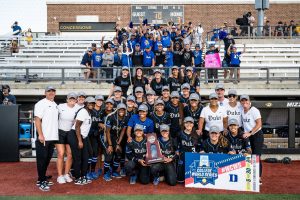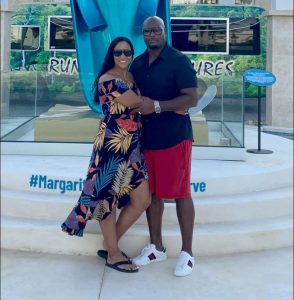Since her appointment as Duke University’s first head softball coach in 2015, Coach Marissa Young has quickly emerged as a prominent figure in the coaching world. Three years after playing their first game ever, Coach Young had the Blue Devils in the postseason.
Remarkably, she guided her team to the Women’s College World Series in 2024— just a year after her husband, James Lamar, was hospitalized following a heart attack.

It took several hours and tests for doctors to discover James was suffering from the effects of a heart attack when he checked himself to the hospital. “I was walking, laughing, and joking. It was a little tough to breathe, but I’d had the same symptoms when I had pneumonia a few weeks before. When the doctor told me it was a heart attack, I was shocked—it didn’t register,” said James.
They scheduled him for what was supposed to be a minor cath lab procedure and within a few hours their lives would change forever. Five surgeries later and 21 days on a ventilator, 44-year-old Lamar was placed on the waiting list for heart and kidney transplants.
On June 14, Young was told that Lamar would need a heart and kidney transplant to live. During this time, she took a leave of absence from coaching to be by his side around the clock.
“Thankfully, everybody at work just supported me and had my back and assured me that I needed to focus on my family,” said Young. “It was very scary and overwhelming. When he was on a ventilator, we weren’t sure if he was going to make it. So, getting him ‘healthy enough’ to qualify for the transplants was somewhat of a relief, because we knew that there was hope.”
After many ups and downs, Lamar received his lifesaving heart and kidney transplant on July 26, 2023.
“I was really exhausted from the process,” said Young. “You get to the end of your rope and feel like how much longer can we handle all of this? Then we received the call, thank goodness. I wanted to be able to thank his donor’s family right away. It is bittersweet, because unfortunately somebody had to lose their life to get his organs. So, there is a happiness, but also a sadness for that family, knowing that they suffered losing someone they loved.”
Since his transplant, Lamar has not experienced any episodes of rejection, describing it as “the perfect match.” Nevertheless, he continues to face an uphill battle on his path to full recovery.

“Because of blood flow loss, he lost all of his fingers and toes and they’re still trying to rebuild his feet so that hopefully he can walk again,” said Young. “He’s up to surgery number 27, but he’s a fighter. He has a really positive outlook and he’s thankful to be here. He’s permanently in a wheelchair, so we’ve had to really revamp the house just to get him around. We used to go out to eat a lot, travel, and go to our kids’ games, so it limits you tremendously. It takes so much more time to do everything, even just getting him to the bathroom to do his daily routine. But we’ve adapted; you find a way to adjust to the new normal.”
Lamar credits his support system for getting him through some of the toughest days of his life.
“My wife took off work for months, and my sister did the same,” said Lamar. “They were in that hospital every night and every day. For anyone facing a transplant, you need your family during that time. You need a loved one in there with you. I’m thankful that my family was there for me, because there were some days where I didn’t think I was getting out of there.”
Lamar’s support system wasn’t limited to just family—the entire Duke softball community has been in his corner from the beginning. As the head of the Lady Dukes travel ball organization, Lamar says that his wife’s coaching career and his journey back to good health are intertwined.
“A lot of the families who are involved on her team played on my youth travel team,” said Lamar. “Those families were very close to me, and I was very close to them. They came to see me in the hospital, and they understood what she was doing. They encouraged her to go be with me, and they encouraged me to sort of get back out there.”
The Blue Devils rallied around the family, raising money via GoFundMe, creating a meal train and having meals delivered to the hospital, helping with the couple’s four children, and continuing to pray for hope and healing.
“I think that was the beauty of it all,” said Young. “We got to see, even through our dark times, the positive impact it had on a lot of other people. There were people who told me that they hadn’t prayed this much in years, but now they’re praying together as a family. It was great to see that it had a positive ripple effect on other people.”
Lamar is now awaiting a bilateral heel reconstruction, an extremely rare procedure performed only three times in the United States.
“He’s had multiple skin graft surgeries, but his heel bone died so he needs a heel bone transplant,” said Young. “When this is completed, it will be another miracle. The doctors wanted to amputate his legs right away, but we didn’t allow that, and we fought to go down this road. While it’s been a long road, I hope that it’s successful and hopefully others will know that there are options other than amputation.”
Despite an uphill battle, Lamar has found strength in the words of his late college football coach, Bill Mallory. “Every day during training he would say to me, ‘it’s time to lock your jaw, James. You gotta’ lock your jaw. Go in there and do your job. You gotta’ get it done.’ When I was in the hospital, I thought about those words every day.”
When asked how his transplant has changed his perspective on life, Lamar has one answer: Time.
“My priorities have changed,” said Lamar. “I was a workaholic, but now I’m more satisfied with the fact that I’m here and I have time to be with my family, my kids. I want to see my kids raise their own families and sit around the table and be a grandpa. Now, I really appreciate my time on Earth more than working and money and all the things that come with it.”
Young echoes her husband’s sentiments, saying that this journey has helped her cherish the moments she has, both on and off the field. Looking ahead, both Young and Lamar hope to personally thank his donor’s family and continue raising awareness about organ donation.
“James is pretty connected in many ways with so many different people, so by saving him, the ripple effect is national,” said Young. “I can’t go anywhere without people asking about him and how he’s doing, and I just hope that they know the tremendous impact that they had not only on our family, but the families who are connected to James. It’s really a beautiful thing. We want the donor’s family to know that the soul of their person lives on, and we honor and cherish the opportunity for James to live on because of them.”
To those who are facing a transplant, James encourages them to keep fighting, even when the outlook is bleak.
“There’s going to come a day when it’s going to be behind you,” said Lamar. “It may not be today, it may not be tomorrow, it might not be next week, but one day it’s going to be behind you. Every day that you’re fighting is a day that you’re closer to the end goal of leaving the hospital. And once that happens for you, you start that second fight—the road to recovery. And that’s a long one, so you’ve got to have some mental toughness. You’ve got to be able to endure. Don’t ever give up. There’s going to come days when you just feel like I’m tired of this, I’m tired of fighting this, I’m just going to lay here and go to sleep. But no— you’ve got to lock your jaw and keep fighting.”
75 lives could be saved and healed from one organ, eye, and tissue donor. Together, we can save lives. Register your decision today at honorbridge.org/registerme


